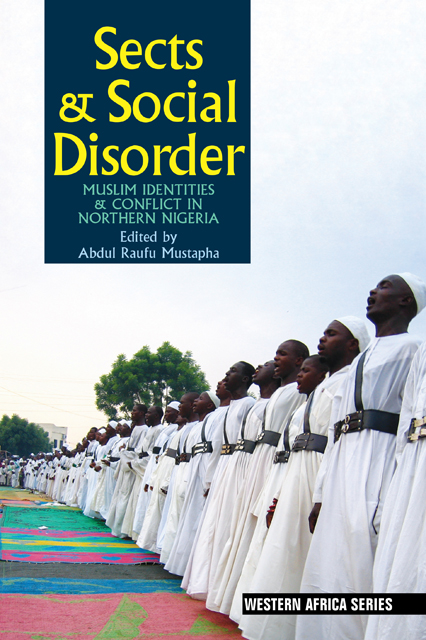Book contents
- Frontmatter
- Dedication
- Contents
- List of Maps, Figures & Tables
- Notes on Contributors
- Foreword by Muhammad Sani Umar
- Acknowledgements
- Glossary
- 1 Introduction: Interpreting Islam: Sufis, Salafists, Shi’ites & Islamists in northern Nigeria
- 2 From dissent to dissidence: The genesis & development of reformist Islamic groups in northern Nigeria
- 3 Contemporary Islamic sects & groups in northern Nigeria
- 4 Experiencing inequality at close range: Almajiri students & Qur’anic schools in Kano
- 5 ‘Marginal Muslims’: Ethnic identity & the Umma in Kano
- 6 Understanding Boko Haram
- 7 Conclusion: Religious sectarianism, poor governance & conflict
- Index
1 - Introduction: Interpreting Islam: Sufis, Salafists, Shi’ites & Islamists in northern Nigeria
Published online by Cambridge University Press: 24 February 2023
- Frontmatter
- Dedication
- Contents
- List of Maps, Figures & Tables
- Notes on Contributors
- Foreword by Muhammad Sani Umar
- Acknowledgements
- Glossary
- 1 Introduction: Interpreting Islam: Sufis, Salafists, Shi’ites & Islamists in northern Nigeria
- 2 From dissent to dissidence: The genesis & development of reformist Islamic groups in northern Nigeria
- 3 Contemporary Islamic sects & groups in northern Nigeria
- 4 Experiencing inequality at close range: Almajiri students & Qur’anic schools in Kano
- 5 ‘Marginal Muslims’: Ethnic identity & the Umma in Kano
- 6 Understanding Boko Haram
- 7 Conclusion: Religious sectarianism, poor governance & conflict
- Index
Summary
Introduction
Since the 1980s, but especially since 1999, northern Nigeria has been racked by repeated episodes of religious and ethno-religious violence involving the loss of thousands of lives, the displacement of hundreds of thousands of people and the destruction of vast quantities of property. This orgy of violence has become worse since 2009 with the transformation of the Salafist Yusufiyya sect into the jihadist Jama‘atu Ahlul Sunnah li Da‘awati wal Jihad (People Committed to the Propagation of the Prophet’s Teachings and Jihad) or Boko Haram. Religion simultaneously constrains and enables action by its adherents, but does so in a way heavy with social memory and the institutional residue of the past. Along with providing a critique of, or justification for, the status quo, it also promises personal salvation and collective redemption. In these many guises, religion is frequently the idiom through which the warring communities in northern Nigeria are mobilized and it is also an important lens through which wider social and political processes, not directly related to the divine, play themselves out in societies like Nigeria, where the people are regarded in one global survey ‘as the most religious people worldwide’ (Ben Amara 2011, 9). This book is about the social and political effects of religion; specifically, it is about the impact on northern Nigerian society of changing Islamic identities.
Islam was introduced into the territory now known as northern Nigeria through trade across the Sahara desert from North Africa, reaching the Kanem-Borno Empire, in the north-east zone, as early as the ninth century AD (Alkali 1993; Kyari 1992; Usman 1983). The religion made headway and developed rapidly because of the interplay of factors such as the expansion of trade, respect for scholarship, the record-keeping needs of indigenous administrations and the subsequent conversion of local rulers to the new faith. Islam started gaining political relevance in Hausaland by the mid-fifteenth century. During the reign of Muhammad Rumfa in Kano (1463–1499), Sharia as a legal system was introduced, and the shura (advisory council), consisting of learned scholars, was institutionalized to guide the governance of the state. The system was adopted and implemented in accordance with the advice of Muhammad al-Maghili (c. 1425–1504), a North African scholar (from Tlemcen in modern-day Algeria) who visited several cities in Sub-Saharan Africa including Kano and Katsina, in the late fifteenth century.
- Type
- Chapter
- Information
- Sects and Social DisorderMuslim Identities and Conflict in Northern Nigeria, pp. 1 - 17Publisher: Boydell & BrewerPrint publication year: 2014
- 2
- Cited by



